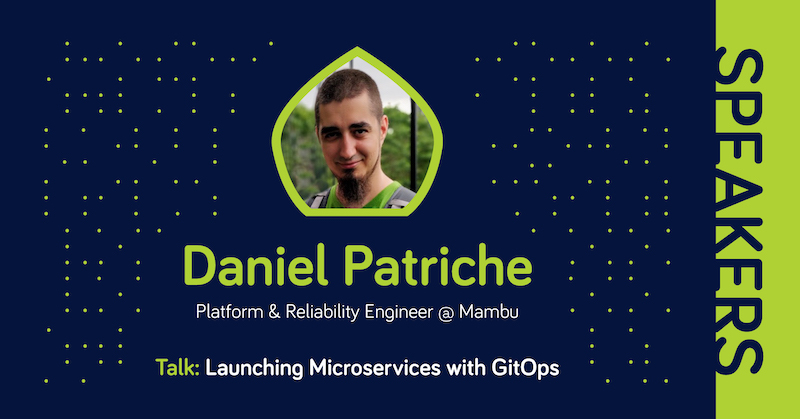
Daniel Patriche: DevOps is a mindset
It is time to get to know a little better another amazing speaker from this edition of DevExperience!
Daniel Patriche is a Platform Engineer at Mambu and he is a real advocate for DevOps practices. You will have the chance to meet him in person and listen to his talk Launching Microservices with GitOps on April 19, of course if you register and get your ticket at DevExperience.
DevExperience: How does it feel to be a local speaker among all these international speakers from all over the world?
Daniel Patriche: It's certainly a challenge, especially since it's one of my first times presenting something publicly. I've been working in an international context for more than 10 years for various companies, so "local" is only relative to who you ask. I'm of course nervous, and while my presentation skills might not match some of the big names coming to this conference, I certainly hope I can make up for it in terms of content and the value of presenting the actual experience of a local company.
DevExperience: What do you think are the strengths and the weaknesses of the local IT community?
Daniel Patriche: One of the most exciting things about doing tech in Iasi as opposed to any other large technology hub is probably getting to work and doing the things you love, but without the extra downsides of living in a hugely crowded and impersonal city. I’m guessing one weakness would be the limited number of positions available, however, there’s pretty much everything for everyone if you’re passionate enough about what you do.
DevExperience: What does devops means for you? Because if we look at devops jobs for example, we might have quite many that are asking for totally different skills and ideas. Is there a core of concepts and tools that if you master you can say you are a devops?
Daniel Patriche: Oh, you had to ask. DevOps today means so many things to different people that it lost its true sense a long time ago.
For me, DevOps isn't a position you can get hired in, but a mindset. The whole idea is bridging the gap between developers and operations. That means developers take a step forward and start understanding how their code gets deployed, ran, monitored, etc in production, while operations start getting their hands dirty with more code, not necessarily business logic, but rather tools streamlining the whole process, helping the devs achieve their tasks, and actively destroying the silo between the two departments. The end result should be that developers don’t throw their code over the wall “to let operations deal with it”.
DevExperience: How did you end up being a devops? Are you coming from a development background or a sysadmin?
Daniel Patriche: Even though my first official job was as a PHP developer, my main background is Linux sysadmin, in the old time where cPanel and VPS hosting was a thing. Even prior to that, I've built physical networks in my neighborhood, so I liked networking and infrastructure for a while. I’ve been involved in building and hosting web applications for more than 10 years, and I’ve tried to evolve my mindset together with all the technology that advanced in this direction up to the point where everything is “as a service”.
DevExperience: Working many years in Iasi as a devops engineer. How do you see the devops community from the city? Does it lack anything at this moment? And what does it need to keep up with the challenges of this fast pace domain?
Daniel Patriche: I've had a chance to meet some really smart guys from the devops community here, so what we're lacking is definitely not talent. Of course, we're only a bunch of people, but we're growing together with the local IT industry. I think what we're missing is a bit more individual commitment, since I see a lot of fresh faces on meetups and conferences, but it's still a core of people that keep showing up.
Fast pace is an understatement for this field as we're constantly working with tools that have months if not weeks since they were conceived, and it's absolutely impossible to know everything you'd need to be able to stay competitive in this field. This is where the community comes in, as it's a friendly way to learn by using other people's skills, mistakes and experience.

DevExperience: Also lately another buzzword appeared in the devops community: gitops. And you are talking about it. Can you explain to us in a few words what does it mean?
Daniel Patriche: GitOps is basically using Git as a source of truth, and defining everything inside it. You may be thinking that your application is already stored in Git, however, GitOps takes it a few steps further by also moving infrastructure, deployment and configuration of the actual applications inside Git, in a declarative manner, and linking these moving parts together in order to form a fully automated process, starting with your code being commited, and ending with your service being successfully operated in production.
Think of it this way: any kind of change you do, be it a new alert, additional capacity or a change in what environment your code gets deployed to means a Git commit which can be reviewed, audited, reverted, etc.
DevExperience: We know that Mambu platform is built on top of Kubernetes orchestrator. Why was it chose? Because 4 years ago very few people heard about it and now a lot of companies are adopting it, so something happened during these years.
Daniel Patriche: Kubernetes grew extremely in the last period, but the most important part is that its adoption and ecosystem grew up to the point where is considered “the” way to do containers at the moment by a lot of voices. We share that voice, since there’s nothing worse in trying to work around the problems of an obscure software, so we chose it due to its exponential growth, promise, stability and performance, and also availability. It’s pretty hard right now to find a cloud provider that doesn’t support it, and also quite impossible for anyone to say that they can’t find someone who’ll run their Kubernetes cluster if they want it as a platform.
DevExperience: Kubernetes seems like a very big project and even with a bigger ecosystem around it. So how hard is it to start with it? And what do you recommend to a devops engineer who wants to adopt it today?
Daniel Patriche: While it’s big, Kubernetes feels very much like an onion (in a good sense). Its outer layers are quite easy to digest as long as you take some time to learn the new jargon, and it’s usually enough to get you running in a couple of days with tons of resources, trainings, courses and tutorials available online. As you get deeper, you start learning more and more about how it functions, and things get increasingly complicated depending on how far you want or need to go with it, just like with any other technology’s internals.
For any engineer wanting to adopt it, I only have one recommendation: don’t be scared of it. It definitely feels scarier than it is, and once you go over that initial learning curve, things start to make a lot of sense.
DevExperience: What are the top 3 lessons that you have learned during your career and that you are happy to share?
Daniel Patriche: Once of the toughest lesson I probably had to learn is the ability to fail. Failing fast and often means you get to learn from your mistakes, you understand the intricate details of your tech (before it has a chance to fail when it hurts), and gets you prepared for the worst. You of course need to understand that failure needs to happen in controlled manners. Let’s not break production, shall we?
Another similarly important aspect is your ability to learn outside of your job. While you may not want to touch your computer once your work schedule is over, keeping up with technology in this field is critical. You may not use everything you learn, but at least you have a rough idea, and that will speed up adoption or research on it quite drastically the next time you need something in that direction.
The third lesson is tied to the second, and to put it simply, it’s “listen to others”. While that sounds more like a soft-skill, what I’m saying is try to see how others are solving their problems. Generally speaking, we all share almost the same problems, even though our solutions are custom tailored to our specific cases and skillset. Go to conferences, meetups, read articles, ask questions. You may not find the holy grail right away, but at least you’ll get some pretty good ideas on what (not) to do.
DevExperience: What are your expectations for DevExperience and why do you recommend the IT community to register and join the event?
Daniel Patriche: I see DevExperience as a good way to bring like-minded people with similar fields and passions together. Boy do I wish I had someone tell me about GitOps before we started stumbling around with it, but hey, now I can try to do that for you. It’s quite impossible to say what’s the best way to get your code to production right now, and what I’ll show you is our take on things, with our experience, attempts, mistakes and feelings. If nothing else, take it as a story. It’s neither a happy or a sad one, but at least you’ll enjoy me sharing it with you.
